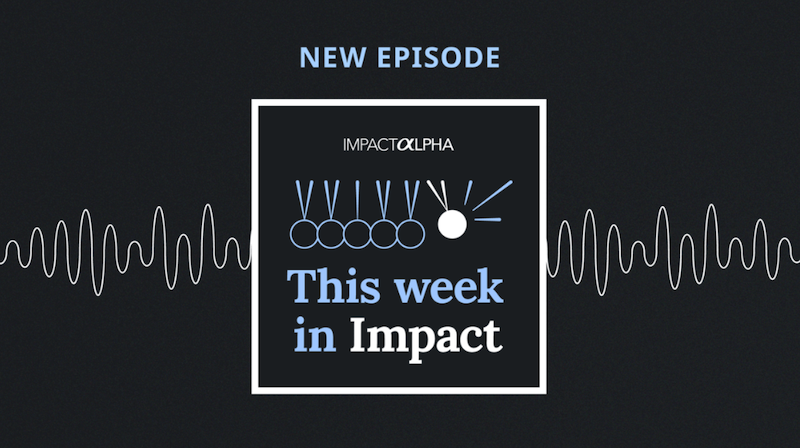In late May, leaders from the GSG and National Advisory Boards (NABs) met for the Global Leadership Meeting in Istanbul to discuss how to accelerate the mobilisation of capital towards impact.
The gathering also marked the 10th anniversary of the creation of the G8’s 2013 Social Impact Investment Taskforce, the forerunner to the GSG that set the wheels of impact investing in motion. It was an opportunity to take stock of the past ten years and chart a path to a better future.
With 121 changemakers from 49 countries in attendance, the event gave a unique view of the progress being made around the globe, as well as the challenges still standing in the way of impact economies and a just transition. High on the agenda were greater policy advocacy and impact transparency, faster mobilisation of private capital, the use of technology and AI, and stronger integration of social and environmental impact in the business world.
Embracing Impact
To appreciate how far we have come, it is worth remembering where we started. Little over a decade ago, the world was recovering from the aftermath of the global financial crisis. The threat of sovereign debt defaults in Europe continued to raise concerns for economies and people around the world. In the midst of the ongoing turmoil, regulators were focused on addressing potential risks at banks and other financial institutions, and investors had very little awareness of ESG or impact investing.
The seeds of impact were already being sown. Governments understood that systems needed to be stronger, while also ensuring that the most disadvantaged in society were not penalised or left behind in the recovery. The impacts of climate change were becoming increasingly apparent, and demands for action to avert climate disasters were heard not just from campaigners, but also from the private sector.
Ten years on, while the immediate threat of sovereign debt default has receded, those of inequality and climate have become truly global priorities driving the most developed countries as well as emerging markets and the Global South.
Today, the GSG network covers 37 countries through 32 NABs, from Bangladesh and Brazil to the USA and Zambia. This global network enables countries to learn from each other, with experience from more mature markets helping inform less developed ones. Following the creation of the first Social Impact Bond (SIB) in the UK back in 2010, which had the goal of reducing reoffending rates among prisoners in Peterborough in eastern England, the use of outcomes-based financing tools has become widespread. At the Global Leadership Meeting, Türkiye NAB unveiled its first SIB, which focuses on tackling youth employment, joining a market that is now worth more than $700 million.
Based on the example of Big Society Capital, intermediaries are being set up to pool impact capital and accelerate the growth of the market. Over the past few months, countries such as Australia, Canada, Ghana, Nigeria and Spain, have committed to inject a combined $1.5 billion into local wholesalers and fund of funds.
Growth in the impact investing ecosystem fuels collaboration, which in turn drives regional and global initiatives. African NABs have joined forces to host the first African Impact Summit, which will take place in South Africa in July and aims to highlight innovation and opportunities in impact investing across the continent. Asset managers are increasingly participating in efforts to mobilise capital for public good while generating investment returns. The UK’s Impact Investing Institute last year brought together 20 investment groups, jointly managing almost $5 trillion in assets, for the Just Transition Finance Challenge, which encourages fund managers to design investment products that contribute to a just transition.
Governments are also shaping economic initiatives with impact in mind. Countries including Colombia, South Africa, and Zambia have included impact in their National Development Plans, while Japan’s Prime Minister Fumio Kishida used his address at Davos in 2022 as the platform to call for a “new form of capitalism” to help revive the Japanese economy. The effect is proving transformational with the public sector now supplying impact capital or using outcomes-based contracting in more than half of GSG member countries.
Impact not only requires capital, but also a regulatory environment that facilitates investment into projects with social and environmental goals. In close to half of GSG member countries, governments have implemented at least one policy or piece of regulation related to impact investing. For example, Argentina’s National Security Commission recently approved a simplified and guaranteed regime for social impact bonds. Impact disclosure rules are being developed in the EU, the UK, and the US, which should have ripple effects across jurisdictions globally.
Market challenges
The result of all these measures is an impact ecosystem that is growing strongly. Among the 23 NABs that were able to provide an estimate, more than a quarter said that their impact markets grew by more than 50% in 2022 — a growth rate aligned with the recent global market sizing studies from the GIIN and IFC. A true estimate of the global market for impact is difficult as there is no internationally accepted methodology, which prevents aggregating data from studies across multiple countries. However, a consortium of European NABs, led by the EU’s EVPA, are working to harmonize their methodologies, a move that could support a clearer estimate of the movement of capital towards impact.
There are other challenges, not least of all the rising backlash against ESG in the US, where the topic has become politicised at a state level. Florida is just one jurisdiction to have introduced a bill that bars state officials from deploying public money, including pension funds, into investments that promote ESG aims. The contrast with Europe could not be more stark, as the EU enhances and extends the Sustainable Finance Disclosure Regulation and rolls out the Corporate Sustainability Reporting Directive.
Mobilizing investment
Progress towards impact over the last decade has been clear and significant. Yet, there remains much to do and the clock is ticking. COVID-19 put many critical measures on hold as countries focused on tackling the immediate health crisis. Now, with less than seven years to meet the UN Sustainable Development Goals, the funding gap is wider than ever. In the aftermath of the COVID outbreak, the OECD warned that an additional $4.2 trillion is needed each year to meet SDG targets, while in emerging markets the disconnect between funding and the investment required is estimated to have increased by at least 50% to $3.7 trillion.
Public investment will never be enough. Impact ecosystems that can channel private capital at scale into investments that champion public good are essential. In October, the GSG Impact Summit will gather impact leaders in Malaga with the objective of committing to ambitious mobilization targets. Together we can put the world on track to a global impact economy and a just transition that leaves no one behind.
________________________________________________________________________________________
Maeva Amarger is knowledge manager at the Global Steering Group, where she facilitates cross-learning between the National Advisory Boards. This article was originally published on Medium.











